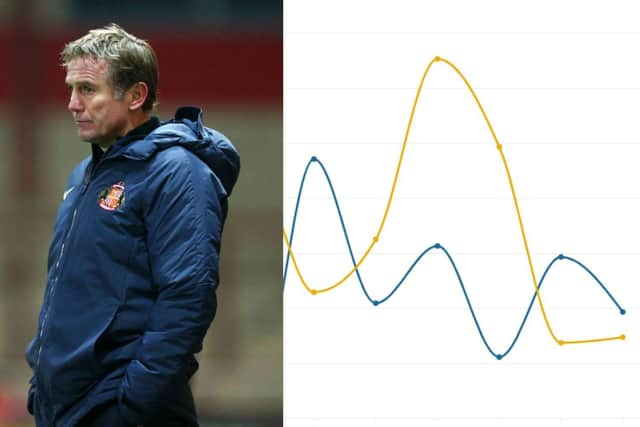Revealed: The underlying data that led to Phil Parkinson's Sunderland sacking
and live on Freeview channel 276
Sunderland’s problems towards the end of Phil Parkinson’s reign, however, can be summed-up relatively simply: they didn’t create enough chances to put teams out of sight, and were starting to fail to keep teams at an arms’ length.
Those issues once again came to the fore at Fleetwood Town, with the Black Cats failing to really trouble Jayson Leutwiler while succumbing to a sustained spell of pressure from the hosts as they sought a leveller.
Advertisement
Hide AdAdvertisement
Hide AdPhil Parkinson’s side were able to ride those storms earlier in the season, but were latterly struggling to keep teams at bay.


They have just one clean sheet in their last eight games in all competitions and, given their lack of firepower at the other end, results are naturally harder to come by.
And it’s data such as that – and the underlying trends we will delve into below – which saw Parkinson relieved of his duties on Sunday evening.
Concerns over Sunderland’s performances are nothing new, of course. Fans and on-lookers have long expressed that a lack of a cutting edge in the final third would catch up with the Black Cats, and that the defence who looked watertight in the early weeks of the campaign could not have the burden of responsibility placed upon them for the entire campaign.
Advertisement
Hide AdAdvertisement
Hide AdParkinson, however, remained confident things would come. He pointed to Sunderland’s high xG (expected goals) and low xGA (expected goals against) tallies and suggested they would ensure the Black Cats would be there or thereabouts come May.
But those tallies began to slip, and the former Sunderland boss could no longer lean back on the underlying data.
Earlier in the season, Sunderland were consistently hitting an xG of around two goals-per-game. They were expected to score more than two at Charlton and Gillingham, and against Ipswich Town.
The fact that they didn’t was put down to finishing, with the onus firmly placed on the Black Cats’ forward players. The chances were coming and if that continued then Sunderland would soon hit the goal trail, was Parkinson’s belief.
But now, the chances are drying up.
Advertisement
Hide AdAdvertisement
Hide AdOther than their goal, Sunderland mustered just one shot on target against Fleetwood and failed to seriously trouble Jayson Leutwiler.
Just one of their 17 crosses yielded anything close to a chance and their goal was in part down to hesitation on the part of the home stopper.
There has been a sharp decline in Sunderland’s xG in their last three games, with the Black Cats expected to score less than one against MK Dons, Doncaster and Fleetwood.
That has dove-tailed with a rise in xGA too – so simply put, the Wearsiders are now creating less and conceding more chances.
Advertisement
Hide AdAdvertisement
Hide AdThe data that Parkinson has so often pointed to is now turning, and painting a picture of a side who are struggling at the back and failing to create anything meaningful in the final third.
Some context is required, of course. Doncaster are a side who will be in the play-off picture come the end of the season, while Fleetwood – despite Joey Barton’s ‘David v Golliath’ narrative – are a side packed with quality and who have spent heavily in recent years.
But something had to change
Parkinson could no longer point to positive trends in the data – and Sunderland decided the change that had to be made would be one in the dugout.